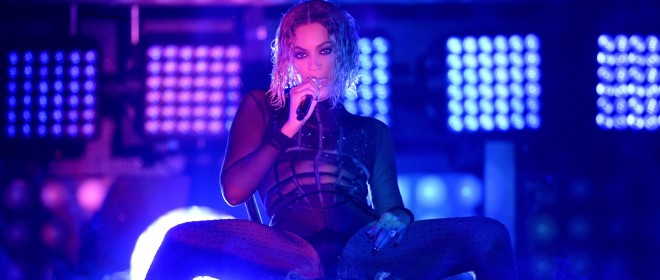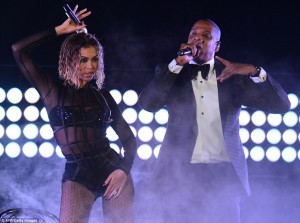
I’ve been thinking a lot about Beyoncé lately. She doesn’t put out the kind of music I generally listen to, but she’s hard to avoid these days—not only in the popular media and on the radio, but on the feminist blogs I read. So I decided to look a bit more closely and see what she’s all about, particularly because she’s generally received a lot of praise from those feminist blogs, which initially surprised me.
First, I listened to “Partition” and read the lyrics, since I had heard it bordered on “uncomfortably” sexual. Indeed, she puts it all out there:
Driver roll up the partition please
Driver roll up the partition please
I don’t need you seeing ‘yoncé on her knees
Took 45 minutes to get all dressed up
We ain’t even gonna make it to this club
Now my mascara runnin’, red lipstick smudged
Oh he so horny, yeah he want to fuck
He popped all my buttons and he ripped my blouse
He Monica Lewinski’d all on my gown
I can see why some people feel like she goes a bit too far. And I can imagine more than a few parents feeling pretty uncomfortable as their children are putting on a show at home and pretending to be Beyoncé singing those words. To them, I say: “Just listen, smile, and applaud.” Nine times out of ten, when kids sing lyrics like that, they have no idea what they mean—and they don’t seem to care.
But how about the message Beyoncé’s sending? That interests me even more. Is she saying something we don’t want our teenagers to hear? Are our teenagers who look up to her walking away with ideas about which we should be uncomfortable, as I know I so often feel about today’s stars, particularly those creating within the hip hop genre? Rap has a long history of exploiting and objectifying women in its lyrics and videos. You don’t have to dig deep to find crude lyrics about women’s butts. There are plenty of videos with what have been called “video vixens,” clad in virtually nothing, being sexually “used” by fully clad male rappers. (For a particularly stark example of this enormous power differential and objectification, watch a few minutes of Nelly’s “Tip Drill.”)
Even Jay-Z has expressed regret for his song (and, presumably, accompanying video) “Big Pimpin’.”
“Partition,” in contrast, is a song about a woman who is a full participant in a sexual experience. She’s horny. She’s on her knees in the back of a limousine giving a blow job that she clearly wants to give to a man she’s lusting after. This is her fantasy—not his. We don’t have his point of view, we have hers. She’s turned on, and she’s enjoying it, and she loves that the man she’s with wants her so much that they can’t even get to the club they were going to.
I then watched and read the lyrics to “Flawless” and “Pretty Hurts.” It’s hard to argue with the messages in those. “Pretty Hurts,” as the title indicates, is about the deep, soul-killing damage that is inflicted on women and girls with our culture’s emphasis on the importance of beauty. In “Flawless,” Beyoncé samples part of a fabulous TED talk by the writer Chimamanda Ngozi Adichie. Perhaps the best part of that video is that it will lead to more people who listen to the original TED talk.
And then there’s the Grammys. Beyoncé opened the show by performing “Drunk in Love” in a revealing outfit, while shaking her butt to the audience, opening her legs while sitting on a chair, and crawling suggestively on the floor. Jay-Z came out near the end for the part of the song in which he rap. He was fully clothed in a tux. Although he touched her butt at one point, his performance didn’t feel lascivious. (I actually find Jay-Z almost endearingly awkward when he raps.) However, I couldn’t help but feel uncomfortable about the stark difference in the ways they were dressed. It was so reminiscent of the power differential in those hip hop videos where the men are fully clad and the women are barely dressed and clearly seen as objects for the male’s enjoyment.
So what was Beyoncé doing at the Grammys? What message was she sending to her legion of fans that stayed up to watch her? How can she reconcile this performance with her statements about feminism and women’s strength and equality? Isn’t she objectifying herself? I struggle with these questions. I don’t know the answer as to what’s on her mind in this particular case, but it occurs to me that Beyoncé walks that narrow, often blurry line that separates sexual empowerment/subjectivity and self-objectification. Some have argued that teenage girls who come to school dressed in a way that seems designed to draw sexual attention to themselves are just exerting their sexual power and freedom. I believe that more often than not they are actually buying into the culture’s message of objectification of the female body. They have spent their lives bombarded by messages that tell them that their value is in their ability to attract male attention. They are not seeing themselves in a subjective way and exerting their sexuality. They are self-objectifying. Similarly, teenage girls who give boys blow jobs without being similarly pleasured are rarely doing so because they are enjoying their sexuality.
But what about Beyoncé? Was she showing herself to be an empowered, sexual woman up on that stage or was she just one more female buying into the cultural heterosexual male “gaze” that sees women as little more than a collection of body parts. In this instance, I’m going to fall on the side of empowerment, while simultaneously arguing that perhaps her message falls short of that because we, as her audience, aren’t always discerning—or, maybe, evolved—enough to see the truth. Part of owning one’s sexuality without embarrassment or shame is acknowledging what turns us on and acknowledging that we have little to no control over what that might be. Is a woman who believes strongly in feminism undermining her cause if her heterosexual fantasies involve some sort of domination? Does what one does “in the bedroom” within a relationship of mutual respect and equality have broader social implications?
Of course not—any more so than the feminist woman who decides that since she has better fine motor skills than her husband, it’s OK that she sews his buttons on for him even if that is a traditionally female task. Not buying into gender roles does not mean that you have to flout any thought or behavior that fits into them. It just means not assigning and taking on tasks purely based on the cultural idea of what is “appropriate” for your gender. Similarly, if a woman gets turned on by wearing certain items or acting in a particular way that excites her partner—and the woman is a full sexual, subjective partner—where is the harm?
While I fall far short of condemning Beyoncé, the harm can come, I think, in what I alluded to before. If her audience is unable to discern the difference between a celebrity who is subjectively asserting her sexuality and one who is buying into the objectification of women’s sexuality, then maybe Beyoncé is inadvertently causing some harm. But is that on her? Should she change what she’s doing? Probably not, because it’s wonderful (if it’s true) to see a woman so completely owning her sexual desire and power—but maybe she could spend more time explaining her thinking. (With an acknowledgment that she already does so. She has a series of videos that do just that, which can be found by searching for: Beyoncé: “Self-Titled” Documentary.)
There’s much more to be said about Beyoncé, but I would be remiss if I didn’t also mention the issue of Jay-Z’s references to Ike Turner and the movie What’s Love Got to Do with It (the biopic of Ike and Tina Turner) in “Drunk in Love.” They’re disturbing and I don’t know what to make of them. I’m not going to pretend I understand all of the lyrics in this song, but in the part to which I am referring, Jay-Z refers to himself as Ike Turner (who was depicted in the movie as very physically abusive toward his wife, Tina) and then refers to a scene in the movie where Ike shoves cake into Tina’s mouth at a diner, after she says she doesn’t want any: “Eat the cake, Anna Mae!” To me, Jay-Z has crossed the line and is missing the difference between a mutual and pleasurable relationship in which some sort of dominance exists during sex and one in which one person is abusive. They are, of course, worlds apart—completely unrelated. I would love to know what both Jay-Z and Beyoncé were thinking when they included these lyrics.
So where does that leave us—or at least me? With a great deal more admiration for both Beyoncé and her music than when I began. She’s put thought into her messages. While sometimes I think she falls a bit short of what she may be striving for, I think our kids could do a whole lot worse in choosing a role model. That being said, as is always the case, parents are an important part of the equation. Talk to your kids about what they think the music is about. Share with them your own interpretations. You may be surprised (as I was) about what each of you will learn.




Pingback: Birds, Bees & Bonobos | Blog: Is Annie Lennox Right About Beyoncé’s “Lite” Brand of Feminism?